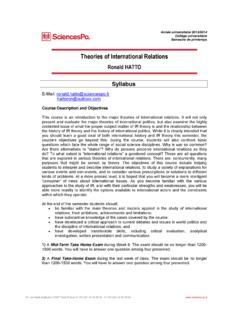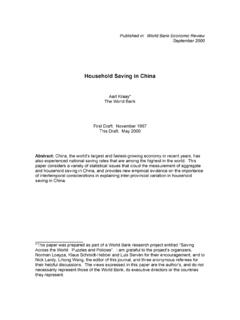Transcription of Identity in International Relations - ISA Theory
1 1 School of Oriental and African Studies Department of Politics and International Studies Identity in International Relations (Course Code: 153400073) Fall 2012 Lectures: Tuesday, 12:00-13:00, KLT Lecturer: Dr Felix Berenskoetter Room: 222 / ph: 0207 898 4682 / email: Office Hours: Tuesday, 15:00-17:00 Tutorials: Tuesday, 14:00-15:00 (B101), 15:00-16:00 (B401) Tutor: Dr Nicholas Michelsen Room: 221 / email: Office Hours: Tuesday, 16:00-17:00 DESCRIPTION AND AIMS This option course for advanced BA Politics students explores how an Identity perspective can be useful for understanding International politics. It unpacks the concept of Identity and its sources parameters forming conceptions of Self and Other and discusses how they affect our ontology of various actors, their behaviour and how they relate. Building on the tradition of constructivist scholarship in International Relations (IR), this course has two main aims: First, to conceptually explore the different ways identities form and how this process affects social life, drawing on insights from philosophy, social Theory and psychology.
2 This will introduce students to various parameters and processes of Identity politics like bordering, bonding, discrimination and socialization. Second, the course will discuss how these play out in phenomena of conflict/violence and cooperation/integration in various sites of International Relations , foreign policy and nationalism. Throughout, students will be asked to also consider the ethical dimension of Identity politics. By the end of a course, students will be able to demonstrate an understanding of the academic and policy debates on the role of Identity in International politics. They will be familiar with various aspects of the Identity formation process and its political nature. Students also will be introduced to methodologies suitable for undertaking research in this area and learn how to integrate an Identity perspective in an analytical framework for exploring a specific empirical case.
3 FORMAT AND ASSESSMENT The course will proceed in form of a one-hour lecture followed by a one-hour tutorial where students will discuss ideas and arguments drawn from the required readings. Students are expected to actively participate in discussions. You must know that you can only meaningfully contribute to the discussion if you have attended the lecture and done the readings. This course covers some difficult conceptual material, which students should not expect to grasp immediately. All the more so, it is very important you take advantage of the tutorials to engage the readings and explore the core arguments authors put forward. 2 Each student will be designated discussant once. The task of the discussant is to start-off debate in tutorials by posing and addressing two to three sharp questions arising out of the required readings and against the backdrop of the lecture.
4 These questions can be critical (expressing disagreement with the argument), or supplementary (adding an aspect you think is missing). Discussants may also ask for clarification on a key aspect of the assigned text (there is always something). The discussant should not be tempted to give a presentation. Student work will be assessed as follows: - Essay (3,000 words): 40% - Exam (two questions): 60% Students must write one 3,000 word paper on a topic exploring a phenomenon in International politics from an Identity perspective. Topics must be selected from the syllabus and students must formulate a particular question which the essay engages. Students must submit their chosen topic to the course convener by 4 December 2012 for approval. The paper must be submitted online and is due on 15 January 2013. This deadline will only be extended under exceptional circumstances and applications will need to be made in writing with supporting material through the Faculty Office.
5 Late essays for which no extension has been given will be penalised at two percentage points per day as required by SOAS regulations. Students are also reminded that plagiarism, the unacknowledged and non-attributed copying of the work and/or ideas of another author, is an examination offence and suspected cases will be submitted to the Registry. READINGS All Required Readings listed below are available electronically through the SOAS library or the course s Moodle site. The Further Readings lists allows you to broaden your reading into areas which you find particularly interesting. To access some of those texts you may need to consult other University of London libraries, such as those affiliated with the LSE, King s College, or Senate House. The following texts are background reading, to be consulted any time during the course: - Berenskoetter, F. ' Identity in International Relations ', in R.
6 Denemark (ed.), The International Studies Encyclopedia (Oxford: Wiley-Blackwell, 2010): 3594-3611, available on BLE - Entry on Identity Politics in Stanford Encyclopedia of Philosophy, available online at - Younge, G. Who Are We and should it matter in the 21st century? (Penguin, 2010). The following books contain useful theoretical and empirical material and students may want to take a closer look at them: - Weldes, J. et al. (eds.) Cultures of Insecurity. States, Communities, and the Production of Danger (Minneapolis: University of Minnesota Press, 1996) - Albert, M., D. Jacobson and Y. Lapid (eds.) Identities, Borders, Orders: Rethinking International Relations Theory (Minneapolis: University of Minnesota Press, 2001) - Hansen, L. Security as Practice. Discourse Analysis and the Bosnian War (London: Routledge, 2006) - Sen, A., Identity and Violence: The Illusion of Destiny (Penguin, 2006) This is not a course on nationalism, but we will inevitably touch on this phenomenon on various occasions.
7 Students with a particular interest in nationalism may want to have a look at these useful readers: G. Delanty and K. Kumar (eds.), The Sage Handbook of Nations and Nationalism (London: Sage, 2006); J. Hutchinson and Smith (eds.) Nationalism (Oxford 3 University Press, 1994). G. Eley and R. G. Suny (eds.), Becoming National, (Oxford University Press, 1996). Among single authored books I recommend B. Anderson Imagined Communities (revised edition, London: Verso, 2006) and R. Brubaker Nationalism Reframed (Cambridge University Press, 1996). COURSE SCHEDULE 1. Introduction: Constructivism, Identity and International Relations PART I: PARAMETERS AND PROCESSES OF Identity FORMATION 2. Identity , Motivation and Action 3. Temporal Dimension: Narrating the Self from Past to Future 4. Social Identity I: Recognition and Socialization 5. Social Identity II: Drawing Boundaries *Reading Week * PART II: Identity DYNAMICS IN International POLITICS 6.
8 Foreign Policy as a Site of Identity Politics 7. Negative Identification: Danger, Violence and Politics of Exclusion 8. Positive Identification: Transnational Ties and the Politics of Amity 9. Crises, Change and Multiple Identities 10. Studying Identity : Methodological Approaches READING LIST 1. Constructivism, Identity and International Relations 02 Oct. There are no required readings for this session. However, the lecture refers to the following: Wendt, A. 'Anarchy is what states make of it: the social construction of power politics' International Organization, 46 (1992): 391-425. Mercer, J. Anarchy and Identity , International Organization, 49/2 (1995): 229-252. Huntington, S. The Clash of Civilizations? Foreign Affairs 72/3 (1993): 22-49. George W. Bush: West Point Graduation Speech, United States Military Academy, New York, 1 June 2002 ( ) Barack Obama: Cairo Speech ( A New Beginning ), Cairo University, 4 June 2009 ( ) Background Readings Agnew, J.
9 Mapping Political Power Beyond State Boundaries: Territory, Identity , and Movement in World Politics , Millennium 28/3 (1999): 499-522. Berger, P. L. and T. Luckmann, The Social Construction of Reality (Doubleday, 1966) Brubaker, R. and Cooper, F. 'Beyond ' Identity '', Theory and Society, 29 (2000): 1-47. Cederman, and C. Daase, Endogenezing Corporate Identities: The Next Step in Constructivist IR Theory , European Journal of International Relations , 9/1 (2003): 5-35. Fearon, J. What is Identity (as We Now Use the Word)?, unpublished manuscript (Stanford University, 1999) ~jfearon/ Ferguson, Y. H. and R. W. Mansbach, Authority, Identities and Change (Columbia: University of South Carolina Press, 1996) Guzzini, S. A Reconstruction of Constructivism in International Relations European Journal of International Relations , 6/ 2 (2000): 147-182 Hall, R. B. (1999) National Collective Identity . Social Constructs and International Systems, New York: Columbia University Press.
10 4 Hopf, T. The Promise of Constructivism in IR Theory , International Security, 23/1 (1998): 171-200 Jackson, P. T. J. and D. H. Nexon Relations Before States: Substance, Process, and the Study of World Politics , European Journal of International Relations 5/3 (1999): 291-332 Jepperson, R. L., A. Wendt and P. J. Katzenstein, Norms, Identity and Culture in National Security , in Katzenstein, P. J. (ed): The Culture of National Security (New York: Columbia University Press, 1996): 33-78. Kowert, P. National Identity : Inside and Out , Security Studies 8/2 (1998/99): 1-34 Lapid, Y. and F. Kratochwil (eds.) The Return of Culture and Identity in IR Theory (Boulder/London: Lynne Rienner, 1996) Neumann, I. B. `Self and Other in International Relations ', European Journal of International Relations 2/2 (1996): 139-174 Owen Vandersluis, S. (ed.) The State and Identity Construction in International Relations (Basingstoke: Macmillan, 1996) Rousseau, D.









